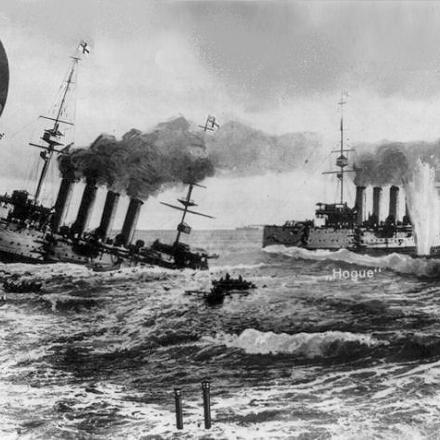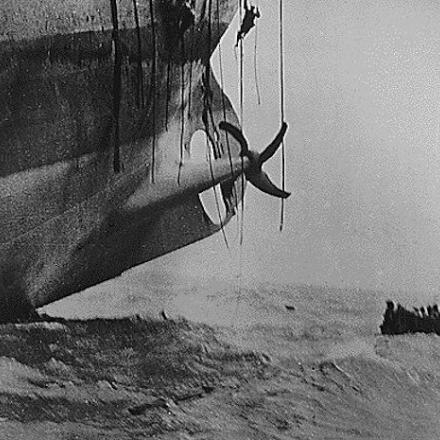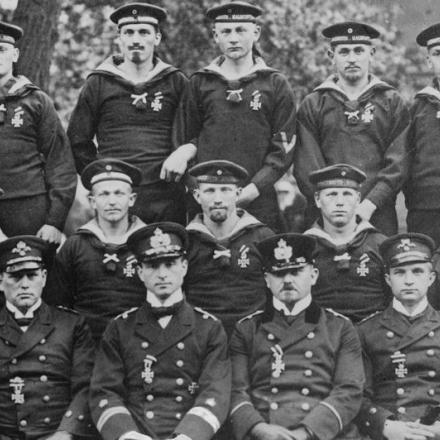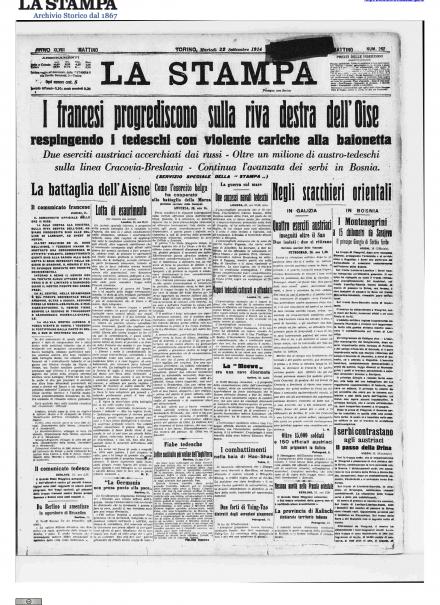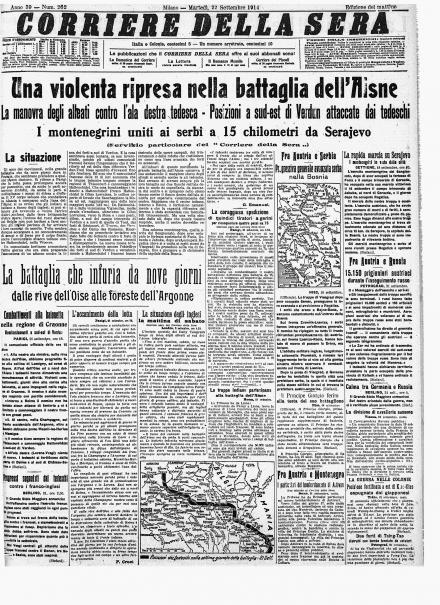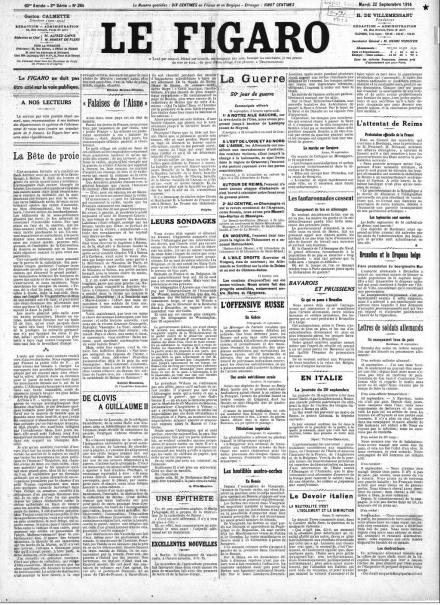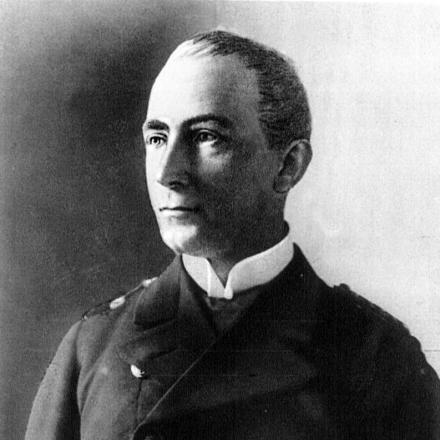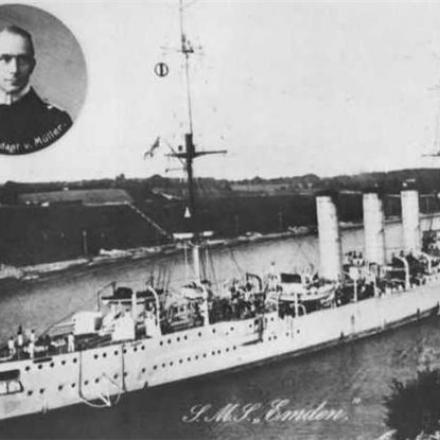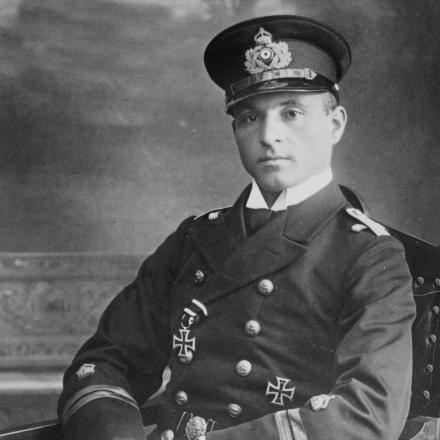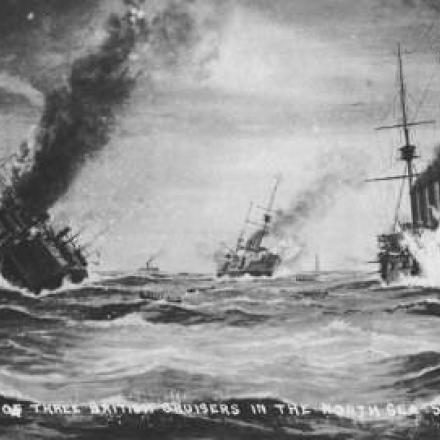Il giorno di Weddigen
Se la situazione resta stabile su tutti i fronti, il 22 settembre si farà la storia dell’aeronautica inglese e della marina tedesca.
Cominciamo dai britannici, arrivati a bombardare le basi aeree di Dusseldorf e Colonia, casa di molti Zeppelin tedeschi. Un bel colpo. Ma non solo: per la prima volta nella storia un aereo riesce a comunicare direttamente con l’artiglieria a terra; un passo fondamentale nello sviluppo delle comunicazioni radio.
In Germania il 22 settembre sarà ricordato per molti anni come «il giorno di Weddigen». Il Comandante dell’U-boat 9, in missione nel Mare del Nord, affonderà in rapida sequenza tre incrociatori britannici: gli “HMS” Aboukir, Hogue e Cressy. Il mare si prende circa 1.600 vite.
Nell’Oceano Indiano riappare la nave tedesca Emden: questa volta la sua incursione colpisce i depositi di carburante britannici di Madras, sulla costa orientale dell’India. Il Capitano Karl von Müller registra un nuovo successo nella sua isolata e indipendente guerriglia “corsara”.
Le scorribande dell’incrociatore leggero tedesco continueranno a seminare il panico, soprattutto tra le flotte mercantili. Müller ha però un grande merito: rispetterà sempre il diritto internazionale, evacuando gli equipaggi civili prima di affondare le navi.
Davide Sartori
GLI AVVENIMENTI
Politica e società
- Il Governo britannico protesta ufficialmente contro le violazioni di neutralità del Governo turco.
- Primo uso del telegrafo senza fili dagli aeroplani dell’aviazione britannica all’artiglieria.
- Sud Africa: il Generale Botha assume il comando al posto del Generale Beyers.
Fronte occidentale
- Aisne: giorno di calma relativa.
- Battaglia di Piccardia: gli Alleati raggiungono una linea che passa avanti a Lassigny-Roye e Chaulnes.
- Primo assalto aereo inglese sul territorio tedesco. Vengono attaccate le basi aeree di Dusseldorf e Colonia.
Fronte orientale
- Galizia: i russi raggiungono Przemysl.
Operazioni navali
- L’incrociatore leggero tedesco “Emden” bombarda Madras.
- Lo squadrone dell’Ammiraglio tedesco von Spee con gli incrociatori “Scharnhorst” e “Gneisenau” bombarda Papeete (Tahiti francese).
- I britannici H.M.S. “Aboukir”,“Hogue” e “Cressy” vengono affondati dal sottomarino tedesco “U-9” nel Mare del Nord, al largo di Rotterdam: periscono 1600 marinai.
Personaggi
Karl von Muller
Ufficiale e gentiluomo. No, non mi riferisco a Richard Gere, ma a Karl von Müller, Capitano di fregata della marina tedesca e, a giudicare dai risultati, una Rock Star dell’oceano.
Nel 1914 non c’è parigrado equiparabile a lui. E probabilmente è una spanna sopra alla maggior parte dei suoi superiori.
Comanda la “Emden”, incrociatore leggero di stanza nel Pacifico; non un bel posto se combatti contro l’Impero britannico e il Giappone.
Quando l’Ammiraglio von Spee, Comandante della flotta tedesca, decide di fare rotta verso il Sud America, Müller azzarda un’idea brillante, ma senza dubbio un po’ folle: una sola, piccola e veloce nave a far danni per l’Oceano Indiano. Quei mari ospitano un numero incalcolabile di rotte commerciali.
Von Spee apprezza e di Müller si fida. E’ fatta, la Emden diventerà qualcosa di molto simile a una “nave pirata”; Müller un moderno “corsaro”.
Invertita la rotta, inizia a scorrazzare per l’Oceano Indiano. Nel giro di due mesi diventerà la nemesi di ogni mercantile. Ne affonderà almeno diciassette ed è qui che entra in gioco il “gentiluomo”.
Müller ha radicato un profondo senso dell’onore, per lui il diritto internazionale non può essere calpestato: prima di colare a picco le navi catturate evacuerà ogni equipaggio civile, garantendo sempre un trattamento adeguato.
Ma la Emden non si limita ai mercantili. Nella sua isolata e indipendente guerriglia “corsara”, il capitano Müller colpirà anche obbiettivi strategici: il 22 settembre distrugge i depositi di carburante britannici di Madras, sulla costa orientale dell’India; mentre all’alba del 28 ottobre si infiltrerà nel porto di Penang, in Malesia, distruggendo un incrociatore russo e un cacciatorpediniere francese.
Le scorribande dell’Emden continueranno a seminare il panico fino al 9 novembre, quando verrà intercettata dall’incrociatore australiano Sidney, durante il sabotaggio di una stazione radio.
Con parte dell’equipaggio in missione a terra e una minore potenza di fuoco Müller perderà il duello e sarà catturato.
Sì, ma intanto le esportazioni indiane sono crollate, per qualcuno addirittura del 60%. E lui è diventato una vera e propria leggenda.
Nel 1917 Müller tenta di evadere dal carcere scavando il più classico dei tunnel; niente da fare.
Rientrerà in patria nel 1918, abbandonando la Marina un anno dopo per motivi di salute; soffriva di malaria dagli sgoccioli del XIX secolo.
Parole d'epoca
Lieutenant Otto Weddigen
A Memoir of the Sinking of the Aboukir, Cressy and Hogue by U-boat U-9 in September 1914
I am 32 years old and have been in the navy for years. For the last five years I have been attached to the submarine flotilla, and have been most interested in that branch of the navy. At the outbreak of the war our undersea boats were rendezvoused at a series of harbours on our coast of the North Sea.
Each of us felt and hoped that the Fatherland might be benefited by such individual efforts of ours as were possible at a time when our bigger sisters of the fleet were prohibited from activity. So we awaited commands from the Admiralty, ready for any undertaking that promised to do for the imperial navy what our brothers of the army were so gloriously accomplishing.
I was married at the home of my brother in Wilhelmshaven to my boyhood sweetheart, Miss Prete of Hamburg, on August 16th. Before that I had been steadily on duty with my boat, and I had to leave again the next day after my marriage.
But both my bride and I wanted the ceremony to take place at the appointed time, and it did, although within twenty-four hours thereafter I had to go away on a venture that gave a good chance of making my new wife a widow.
But she was as firm as I was that my first duty was to answer the call of our country, and she waved me away from the dock with good-luck wishes.
I set out from a North Sea port on one of the arms of the Kiel Canal and set my course in a south-westerly direction. Thus I was soon cruising off the coast of Holland. I had been lying in wait there only a few days before the morning of September 22nd arrived, the day on which I fell in with my quarry.
When I started from home the fact was kept quiet and a heavy sea helped to keep the secret, but when the action began the sun was bright and the water smooth - not the most favourable conditions for submarine work.
I had sighted several ships during my passage, but they were not what I was seeking. English torpedo boats came within my reach, but I felt there was bigger game further on, so on I went. I travelled on the surface except when we sighted vessels, and then I submerged, not even showing my periscope, except when it was necessary to take bearings. It was ten minutes after 6 on the morning of last Tuesday when I caught sight of one of the big cruisers of the enemy.
I was then eighteen sea miles northwest of the Hook of Holland. I had then travelled considerably more than 200 miles from my base. My boat was one of an old type, but she had been built on honour, and she was behaving beautifully.
I had been going ahead partly submerged, with about five feet of my periscope showing. Almost immediately I caught sight of the first cruiser and two others. I submerged completely and laid my course so as to bring up in the centre of the trio, which held a sort of triangular formation. I could see their grey-black sides riding high over the water.
When I first sighted them they were near enough for torpedo work, but I wanted to make my aim sure, so I went down and in on them. I had taken the position of the three ships before submerging, and I succeeded in getting another flash through my periscope before I began action. I soon reached what I regarded as a good shooting point.
Then I loosed one of my torpedoes at the middle ship. I was then about twelve feet under water, and got the shot off in good shape, my men handling the boat as if she had been a skiff. I climbed to the surface to get a sight through my tube of the effect, and discovered that the shot had gone straight and true, striking the ship, which I later learned was the Aboukir, under one of her magazines, which in exploding helped the torpedo's work of destruction.
There were a fountain of water, a burst of smoke, a flash of fire, and part of the cruiser rose in the air. Then I heard a roar and felt reverberations sent through the water by the detonation. She had been broken apart, and sank in a few minutes. The Aboukir had been stricken in a vital spot and by an unseen force; that made the blow all the greater.
Her crew were brave, and even with death staring them in the face kept to their posts, ready to handle their useless guns, for I submerged at once. But I had stayed on top long enough to see the other cruisers, which I learned were the Cressy and the Hogue, turn and steam full speed to their dying sister, whose plight they could not understand, unless it had been due to an accident.
The ships came on a mission of inquiry and rescue, for many of the Aboukir's crew were now in the water, the order having been given, "Each man for himself."
But soon the other two English cruisers learned what had brought about the destruction so suddenly.
As I reached my torpedo depth I sent a second charge at the nearest of the oncoming vessels, which was the Hogue. The English were playing my game, for I had scarcely to move out of my position, which was a great aid, since it helped to keep me from detection.
On board my little boat the spirit of the German Navy was to be seen in its best form. With enthusiasm every man held himself in check and gave attention to the work in hand.
The attack on the Hogue went true. But this time I did not have the advantageous aid of having the torpedo detonate under the magazine, so for twenty minutes the Hogue lay wounded and helpless on the surface before she heaved, half turned over and sank.
But this time, the third cruiser knew of course that the enemy was upon her and she sought as best she could to defend herself. She loosed her torpedo defence batteries on boats, starboard and port, and stood her ground as if more anxious to help the many sailors who were in the water than to save herself.
In common with the method of defending herself against a submarine attack, she steamed in a zigzag course, and this made it necessary for me to hold my torpedoes until I could lay a true course for them, which also made it necessary for me to get nearer to the Cressy.
I had come to the surface for a view and saw how wildly the fire was being sent from the ship. Small wonder that was when they did not know where to shoot, although one shot went unpleasantly near us.
When I got within suitable range I sent away my third attack. This time I sent a second torpedo after the first to make the strike doubly certain. My crew were aiming like sharpshooters and both torpedoes went to their bulls-eye.
My luck was with me again, for the enemy was made useless and at once began sinking by her head. Then she careened far over, but all the while her men stayed at the guns looking for their invisible foe. They were brave and true to their country's sea traditions. Then she eventually suffered a boiler explosion and completely turned turtle.
With her keel uppermost she floated until the air got out from under her and then she sank with a loud sound, as if from a creature in pain.
The whole affair had taken less than one hour from the time of shooting off the first torpedo until the Cressy went to the bottom. Not one of the three had been able to use any of its big guns.
I knew the wireless of the three cruisers had been calling for aid. I was still quite able to defend myself, but I knew that news of the disaster would call many English submarines and torpedo boat destroyers, so, having done my appointed work, I set my course for home.
My surmise was right, for before I got very far some British cruisers and destroyers were on the spot, and the destroyers took up the chase. I kept under water most of the way, but managed to get off a wireless to the German fleet that I was heading homeward and being pursued.
I hoped to entice the enemy, by allowing them now and then a glimpse of me, into the zone in which they might be exposed to capture or destruction by German warships, but, although their destroyers saw me plainly at dusk on the 22nd and made a final effort to stop me, they abandoned the attempt, as it was taking them too far from safety and needlessly exposing them to attack from our fleet and submarines.
How much they feared our submarines and how wide was the agitation caused by good little U-9 is shown by the English reports that a whole flotilla of German submarines had attacked the cruisers and that this flotilla had approached under cover of the flag of Holland.
These reports were absolutely untrue. U-9 was the only submarine on deck, and she flew the flag she still flies - the German naval ensign - which I hope to keep forever as a glorious memento and as an inspiration for devotion to the Fatherland.
I reached the home port on the afternoon of the 23rd, and on the 24th went to Wilhelmshaven, to find that news of my effort had become public. My wife, dry eyed when I went away, met me with tears. Then I learned that my little vessel and her brave crew had won the plaudit of the Kaiser, who conferred upon each of my co-workers the Iron Cross of the second class and upon me the Iron Cross of the first and second classes.
